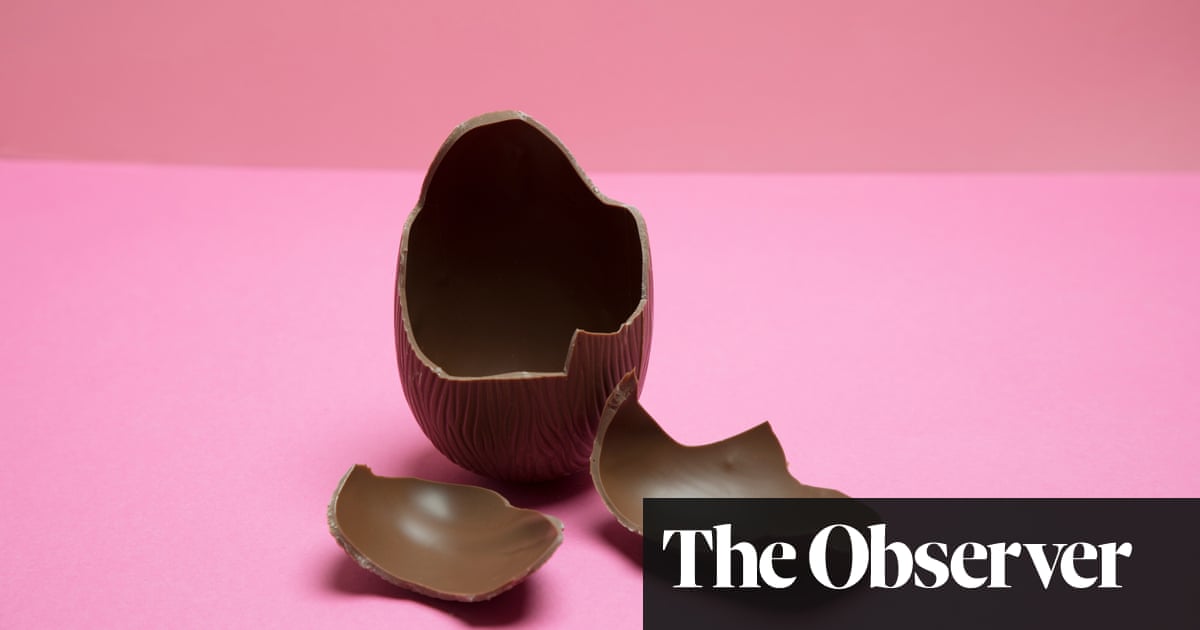Every Easter, UK consumers collectively spend more than £1bn on food, drink, gifts, entertainment and about 80m chocolate eggs, racking up an average bill exceeding £50 each. But shoppers this year are paying more than usual: since last Easter, chocolate prices have increased by more than 12.6%, more than double the rise in supermarket food and drink prices.
The cost of cocoa, chocolate’s main ingredient, has been increasing all year, hitting a record high just before Valentine’s Day and again this week, when it was priced at more than $10,000 a tonne – meaning it is currently more valuable than several precious metals, and growing in value more quickly than bitcoin.
Increasing costs stem from a cocoa shortage in west Africa, in particular Ghana and Ivory Coast, where more than half of the world’s cocoa beans are harvested. According to experts, the shortage is explained by interconnected factors including climate-related weather events and exploitation inherent in the cocoa industry. It has come at a time of increased global demand, also contributing to scarcity and subsequent price rises.
…
“This has been a nightmare waiting to happen,” said Amarachi Clarke, founder of the London-based chocolate brand Lucocoa. “When we talk about chocolate, how often do you hear the words ‘climate change’ or ‘living income’ or ‘lack of investment’? But all these things are starting to come to a head now, and we’ve got a huge problem.
“These are related issues because the majority of our chocolate comes from a small number of massive cocoa-processing companies which have gotten away with not paying farmers a living income, despite increased demand.
“If you’re not paying a farmer properly, they can’t afford to respond to climate change by investing in land, planting new crops or taking care of their plants, and you also get layers of slave and child labour.”
On the plus side, this won’t affect Cadbury or Nestlé’s chocolate, as it had bugger all cocoa to begin with.
Cocoa plant yields were talked about briefly in an episode of the podcast Behind the Bastards. According to episode 89 about Bjorn Lomborg and climate change there is a fly that pollenates cocoa plants and due to climate change this fly’s numbers are dwindling.
The nestle wanker said that there is no chocolate without slaves. I’m fine with no chocolate
Those wankers were saying there is no society without slaves for millennia. Just saying they might be wrong.
This is the best summary I could come up with:
Every Easter, UK consumers collectively spend more than £1bn on food, drink, gifts, entertainment and about 80m chocolate eggs, racking up an average bill exceeding £50 each.
The cost of cocoa, chocolate’s main ingredient, has been increasing all year, hitting a record high just before Valentine’s Day and again this week, when it was priced at more than $10,000 a tonne – meaning it is currently more valuable than several precious metals, and growing in value more quickly than bitcoin.
“These are related issues because the majority of our chocolate comes from a small number of massive cocoa-processing companies which have gotten away with not paying farmers a living income, despite increased demand.
Lucocoa is still recovering from Covid-related loss of income and rising energy prices, as well as higher costs and lead times associated with Brexit, said Clarke.
Douglas Lamont, CEO of Netherlands-based Tony’s Chocolonely, founded in 2005 with the mission of eliminating exploitation in the chocolate supply chain, told the Observer the company supported higher costs if it means more money going to farmers.
Dr Michael Odijie, who has been researching cocoa farming conditions in west Africa at University College London, said a historic focus on keeping consumer prices low had contributed to long-term exploitation.
The original article contains 771 words, the summary contains 207 words. Saved 73%. I’m a bot and I’m open source!




